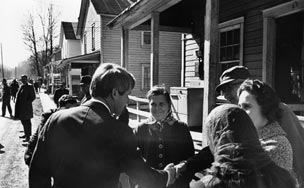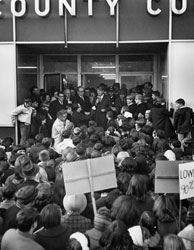

|
About RFK's 1968 Tour // About the Project
Project Description & History · John Malpede · Reconsidering the War on Poverty · About RFK's 1968 Tour · "Be it Remembered" - Pages from the original transcripts · Announcement Press Conference It is a revolutionary world we live in. Governments repress their people; and millions are trapped in poverty while the nation grows rich; and wealth is lavished on armaments. For the fortunate among us, there is the temptation to follow the easy and familiar paths of personal ambition and financial success so grandly spread before those who enjoy the privilege of education. But that is not the road history has marked for us. The future does not belong to those who are content with today, apathetic toward common problems and their fellow man alike. Rather it will belong to those who can blend vision, reason and courage in a personal commitment to the ideals and great enterprises of American society.
We decided to hold more field hearings on hunger. By then, though, the war in Vietnam had become even more enveloping and draining as a political issue. The country was deeply divided, and Kennedy was under relentless pressure from antiwar advocates to run for president. So we weren't able to get back to hunger until the beginning of 1968 . . .
I learned in eastern Kentucky that my true calling in this world was not as an advance person (or advance man, as it literally was then). Tom Johnston, from the Senator's New York office, who was a native Kentuckian, and I went down to Kentucky to advance the trip. We set up a good itinerary, with the help of Tom Gish, the editor and publisher of the Mountain Eagle, in Whitesburg, Kentucky; Milton Ogle, a terrific community organizer who was the head of the Appalachian Volunteers; and John Tiller, a former coal miner and a local activist. What neither of us foresaw was the degree of press interest. It was the second week of February 1968, and speculation was rife about whether RFK would run for president . . . Tom and I hadn't rented a bus, assuming that whatever press we had would rent their own cars and form a caravan. The caravan turned out to be thirty or forty cars. This caused a general grumpiness and threw our timing out the window. Drive times between stops doubled. By the end of the first day we were three hours behind schedule. That was, most emphatically, not the way Robert Kennedy did business. We had arranged a number of chances for Kennedy to drop in on families. He would go in, have a conversation, and be ready to leave before the end of the caravan pulled up at the house. There were some really irritated reporters.
Robert F. Kennedy toured eastern Kentucky on February 13 and 14, 1968, landing at Lexington 's Bluegrass Airport and traveling over two hundred miles in those two days. At the same time, in Vietnam, the Tet Offensive was still underway - marking a major turning point in both the war and in attitudes toward it. Less than a month later, RFK would announce his candidacy for presidency.
With Congressman Carl D. Perkins of Kentucky, an influential congressman responsible for an important body of adult literacy and technical education legislation, Kennedy toured eastern Kentucky 's coal country, the same territory where President Lyndon Johnson had declared the war on poverty in 1964. Kennedy held field hearings for the Senate Subcommittee on Employment, Manpower and Poverty in two locations during the tour, in Vortex and Fleming-Neon, taking testimony that would be entered into the Congressional Record. RFK also visited individual homes, schoolhouses, and county centers during his tour, focusing on the needs of children and young people, asking questions about what they had eaten that day, and viewing for himself the effects of both poverty and the federal efforts to combat it. The schedule of the tour was grueling: Kennedy met dozens of people individually, spoke to thousands, and traveled over rough mountain roads, starting with a hearing in Vortex at a one room schoolhouse whose entire student body consisted of the children of one rural family; on to another one room school in Barwick, where the teacher, Bonnie Jean Carroll cooked a hot meal for her students on a pot-bellied stove everyday; on to Hazard, where he toured the African American neighborhood, Liberty Street; to a strip mining site where he viewed for himself the physical destruction produced by surface mining; and ended day one at Alice Lloyd College near Congressman Perkins' hometown of Hindman. February 14th started with a drive to Whitesburg and an early morning speech on the Letcher County Courthouse steps; followed by a formal hearing at the Fleming-Neon High School gym; visits with families in Hemphill and Haymond, a speech at the Fiscal Court and Library in Prestonsburg, and ends with Kennedy being flown off in the governor's plane to attend a dinner in his honor at the home of the Binghams in Louisville, then owners and publishers of the influential Courier-Journal. During the dinner of filet mignon, Kennedy was unable to stop himself from noting the disparity of experience. Kennedy's tour of the region was not a unique event: his brother John had planned to come in December of 1963, Johnson came in 1964 and, in later years, Nixon, Ted Kennedy, Bill Clinton, Paul Wellstone, and Jesse Jackson all conducted "poverty tours" that included eastern Kentucky. Of these, the people of the region remember RFK's as the most meaningful, his person the most understanding and best listener. People often cite his large family, his warmth, and his genuine concern when they talk about his effect on them, and speak of the way he brought hope, hope that was dispelled a few months later, with his assassination in June of 1968.
|
 We went to eastern Kentucky . . . , the last visit we were able to make before Kennedy decided to run for president. Visiting families and holding community hearings in a school gymnasium, we documented the existence of serious hunger in that economically devastated former coal-mining area. The inquiry revealed not just the economic decline but the power disparities. In nearly every place, especially rural communities, where we found a severe unwillingness to help the poor, we also found, and not always because of ethnic differences, a pocket of feudalism in America: a local power structure committed to perpetuating itself at all costs and unwilling to countenance the slightest improvement in the lives of the excluded, for fear they would gain the confidence and the wherewithal to overturn the status quo at the ballot box. Elected officials, judges, police officers and sheriffs, and local bankers and business people were always ready to use any tool necessary to quash dissidence whenever it appeared. This was true in Cesar Chavez's world in California, in the Rio Grande valley in south Texas, in Mississippi, and in Appalachia.
We went to eastern Kentucky . . . , the last visit we were able to make before Kennedy decided to run for president. Visiting families and holding community hearings in a school gymnasium, we documented the existence of serious hunger in that economically devastated former coal-mining area. The inquiry revealed not just the economic decline but the power disparities. In nearly every place, especially rural communities, where we found a severe unwillingness to help the poor, we also found, and not always because of ethnic differences, a pocket of feudalism in America: a local power structure committed to perpetuating itself at all costs and unwilling to countenance the slightest improvement in the lives of the excluded, for fear they would gain the confidence and the wherewithal to overturn the status quo at the ballot box. Elected officials, judges, police officers and sheriffs, and local bankers and business people were always ready to use any tool necessary to quash dissidence whenever it appeared. This was true in Cesar Chavez's world in California, in the Rio Grande valley in south Texas, in Mississippi, and in Appalachia. Kennedy's purpose in touring eastern Kentucky was to examine the outcomes of the first wave of "war on poverty" legislation with the people it most affected - previous trips of inquiry were made to the San Joaquin Valley of California, the Mississippi Delta, northern New Mexico, and the hills of western Pennsylvania.
Kennedy's purpose in touring eastern Kentucky was to examine the outcomes of the first wave of "war on poverty" legislation with the people it most affected - previous trips of inquiry were made to the San Joaquin Valley of California, the Mississippi Delta, northern New Mexico, and the hills of western Pennsylvania.